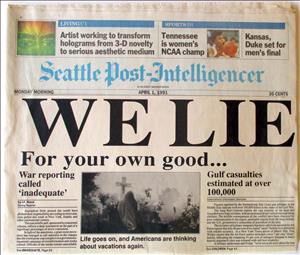On Monday, April 1, 1991, citizens of Seattle -- already jittery from the George H. W. Bush administration's long saber-rattling PR campaign and then its January 17th Operation Desert Storm attack against Iraqi forces -- wake to find their morning edition of the Seattle Post-Intelligencer bearing a shocking headline: "WE LIE For your own good ..."
A Tale of Two Headlines
Additional above-the-fold headlines in that P-I included "Gulf casualties estimated at over 100,000," and "Life goes on, and Americans are thinking about vacation again." A third -- "War reporting called 'inadequate'" -- got to the heart of the matter: that many people felt that the city's oldest metropolitan newspaper had been among the news-media outlets who had aided the White House's efforts to create an unjustified level of general fear about a purportedly dangerous enemy. A foe who was then vanquished in less than 60 days of battle -- albeit with massive loss, according to he International Red Cross, of Iraqi civilian lives. That essay opened with a statement that "Journalists from around the world have shirked their responsibility" and that "concerned citizens" have "a deep resentment" that "the world press was complicit in a government-organized campaign of misinformation and media control."
For a stunned moment or two, at least a few locals naively figured that the P-I had miraculously searched its soul and bravely come forth with a confession -- but it didn't take long to realize that: nah, it was just April Fool's Day! That blaring headline -- featuring GIGANTIC 2.25-INCH-TALL type-font -- was indeed not the P-I's intended front page, but rather, a 7.5 inch-tall strip of newsprint that had been cleverly applied over the actual feel-good top story: "20,000 GIs will leave Iraq, officers say."
Sympathy for the Rebels
As the hours passed, news broke that the whole thing had been an agit-prop protest prank conducted by an anti-war group called Disturbing the Peace. That band of artists -- in a well-planned scheme -- had raided newspaper street racks around town, pasted their fake satirical headline sheets to each copy, and then raced to return the altered units back to those various newspaper-vending street racks.
The P-I's publisher, Virgil Fassio, denounced the stunt as "unauthorized and illegal" and "a cowardly act" of sabotage "in the dead of night" that was "not likely to earn any sympathy for any cause." Newspaper circulation crews scrambled quickly and were able to confiscate and destroy about 500 copies of the altered units before they were purchased by any more unwitting customers.

